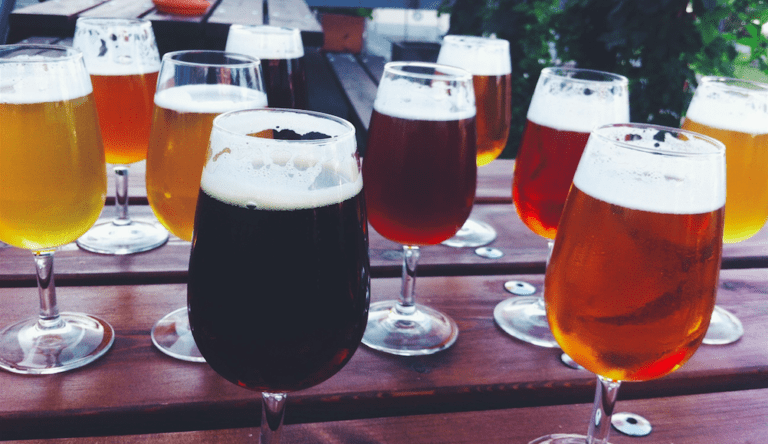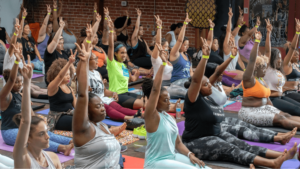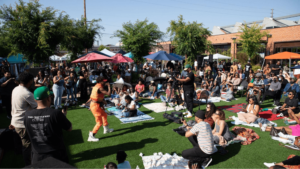Founded in 1997, the Michigan Brewers Guild hosts four large beer events annually. These highly popular gatherings include the Winter Beer Festival in Grand Rapids, Summer Beer Festival in Ypsilanti, Detroit Fall Beer Festival, and UP Fall Beer Festival in Marquette. The Guild also organizes its annual Winter Conference in January geared towards guild members across the Michigan beer industry.
We asked Michigan Brewers Guild Executive Director, Scott Graham, and Operations Manager, Shannon Kuchera, to share their insights around planning and operating great beer events, what trends they’re seeing in the industry, and what’s next in the world of craft beer.
Eventbrite: Can you tell us a bit about the Michigan Brewers Guild?
Graham: The Michigan Brewers Guild is one of the older guilds in the country. We exist first and foremost to support and promote the consumption of Michigan craft beer. And what better way to do that than to host events where people can meet and interact with our 148 member breweries? Our goal is to create a really great festival experience, and we’ve found that our events have helped unify our membership, and as a result, make an impact culturally and economically throughout the state.
Eventbrite: What are some keys to success in running great, large-scale events?
Graham: It really comes down to communication and building a strong team. What I’ve found over the years is that the better you can communicate, and the more organized and structured you are, the smoother your events will be. We’re also very fortunate to have a really great staff and core group of volunteers that, together, make it all happen.
Kuchera: We couldn’t do things at the level we do without the team. Years ago the board handled all the logistics behind our events, but they don’t need to anymore. Our team in all is about 20 to 25 people, and they travel with us to every festival. We also recruit local volunteers on top of that.
Eventbrite: How do you recruit volunteers, given that your events are held all over the state?
Graham: Many of our volunteers come from the local charity groups that we partner with. We have about 12 different organizations across different events total. In exchange for their time and help, we make cash donations to their charities and causes, and that goes a long way. We try to be conscious of the fact that we’re not based in the towns where our events are held, and so we find groups that make an impact in those communities.
Eventbrite: With the size and popularity of your beer festivals, you must run into lines at the gate. How do you ensure a positive experience for the people that attend?
Graham: We definitely see people lining up—sometimes it’s around a full city block. For one of our events, we saw lines circling a minor league baseball stadium prior to festival opening.
The key is to really think about entry logistics beforehand, and then to regroup after the event to figure out what we can do to make the process better next time. I’ve also found that it has to be the right person with the right attention to detail to oversee our gate operations. Thankfully we have one volunteer that has been with us for several years that leads that effort. Not sure what we’d do without him.
Eventbrite: How has Eventbrite helped in this process?
Graham: Every ticketing company has a bar code and scanner, and so for us, it’s more about the fact that Eventbrite’s system can handle a really large volume of ticket holders at one time.
Kuchera: Agreed, and beyond our festivals, Eventbrite also handles registration for our professional conference, which draws 300 guests. The event keeps growing every year, and managing registration can be challenging. It’s been really great to have a system that can handle both the festivals and the conference, and to have all the tools I need in the backend from an event operations perspective.
Eventbrite: The Summer Festival features more than 800 beers from over 80 Michigan breweries. That’s a massive undertaking.
Graham: It absolutely is. That’s why we ask the breweries to bring volunteers who will pour, as opposed to supplying them ourselves. Each brewery may bring up to eight staff members to the event, which means there are a lot of people that we need to make sure have all the information they need to provide a smooth festival experience for everyone involved from set-up to take-down.
To help with that, last year I launched the “Festival Manager Certification Course.” In order to participate in one of our events, each brewery has to send someone from their team to attend a 45-minute class to cover the logistics, as well as the rules around things like pour guidelines. The course is about getting the people that support our event aware of their responsibility, and it’s been well received.
Eventbrite: What advice do you have for beer festival organizers around the country?
Graham: Try to deliver a great experience for the brewers. Without them, it’s nothing, and that’s what people come for. For one, buy their beer. That’s what we do, which so many organizers out there don’t.
Kuchera: We also try to give them an exclusive, behind-the-scenes experience. That means special bathrooms, including air-conditioned outdoor toilets in the summer when you need it. We also make sure there’s good food, and even have a masseuse on hand. It’s the little things that count.
Graham: With more and more festivals popping up, every brewery is being approached and will have to say no to some events. We want to make sure the Michigan Brewers Guild festivals are always at the top of their list.
Eventbrite: Do you have any tips for beer festival organizers just getting started?
Graham: The first couple of years we started organizing events were a struggle financially. For a long time, we sold more than half of our tickets at the gate. Eventually we gained momentum and added more events, which helped us take off. But my advice to groups just getting started is to plan for the long-term and not expect to break even in the first year. You’ll see growth the second year over the first year if you get good consumer feedback and can act on it. We do hardly any marketing and instead rely on grassroots word-of-mouth. That comes with focusing on making our events the best possible experience for both the people that attend, and for our member breweries who participate.
Eventbrite: What trends have you seen with respect to beer festivals?
Graham: First, there are tons of other events and the sheer quantity is noteworthy— everyone is trying to get into the business. One trend I’m hearing a lot about is the focus on local. For us, that means Michigan-made, but the whole local movement is definitely impacting craft beer and events nationally.
Kuchera: I’m also seeing a lot of differentiation. Organizers are finding ways to distinguish their events by picking a specialization such as cask ale, barrel aged, Belgium, etc., or by choosing a theme. Events such as Brewski Festival, which is a beer festival held at a ski resort, and Hops and Pops, a beer festival combined with a boat show. These events put a different spin on the festival experience.
Graham: For larger events, people want variety. The way we’re organized, the beer needs to be produced in Michigan. But for other festivals, bringing in lots of different kinds of beer from different places is becoming a draw.
Eventbrite: So what’s next in the beer industry?
Graham: I think we’ll see continued growth and development which means more microbreweries both here in Michigan, and nationally. Specialization in things like sustainability, renewable energy, and organic-only is also hot, and I imagine we’ll see more breweries adopting these ways of doing business.
Kuchera: Anticipate more howlers, which are baby versions of growlers, as well as pressurized growlers and cans. Mobile canning is also gaining momentum and is great as it supports smaller breweries that don’t have a canning line. In addition, we’ll see continued experimentation with beer flavors and non-traditional ingredients while at the same time expect to hear more backlash against those who see it as ‘putting weird stuff in beer’. It’s a difference in perspective between “the purists” and “the explorers”.
Graham: I’ll add that a lot more women are getting involved in the craft beer industry. It’s more than just the guys bringing their wives and girlfriends—it’s teams and clubs of women. Price point is also a contentious issue. I think we’ll continue to see the price of session IPAs getting closer to the more budget-conscious student, which should be interesting.
To learn more about our craft beer community visit www.eventbrite.com/beer.





